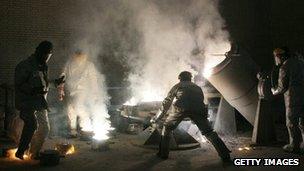Tomorrow’s tech - staying safe online
- Published
- comments

For the World at One on Radio 4 I've done a series of essays on how technology will change our lives over the next few years. Today's essay examines the issue of cybersecurity, as consumers, corporations and governments struggle to stay safe online.
A couple of weeks back, a writer for the technology site Wired had a sobering experience. His Google account was taken over and deleted, his Twitter persona was hijacked - and his Apple iCloud account was captured by hackers who proceeded to delete everything from his computer and his phone.
"My entire digital life was destroyed, external," he wrote. It was a reminder that in an era where we put more and more of our lives online, we're coming to terms with new dangers. For consumers there is the threat of viruses, identity theft or cyberstalking.
Rory Cellan-Jones: In an era where we put more and more of our lives online, we're coming to terms with new dangers.
For companies there is the fear that at any time their systems can come under attack, putting vital data and reputation at risk. It used to be mischievous teenagers hacking into corporate systems just to show they could - now organised crime has moved in, often deploying botnets, armies of computers hijacked without their users knowledge, to wreak havoc.
And in recent years a new threat has emerged - cyberwarfare, where governments launch attacks on each other's infrastructure using computers rather than tanks or bombs. But for all the talk of Chinese or Russian cyber warriors ready to destroy our vital systems, there has only been one real incident of any note.
Stuxnet, a computer worm released by the United States and Israel, brought a temporary halt to Iran's nuclear programme. Dave Clemente of Chatham House thinks that may set the pattern for future cyberwarfare:

Iran's nuclear enrichment efforts have been targeted by sophisticated cyber attacks
"We've heard a lot about potential disaster scenarios - attackers heavily disrupting the power grid, or transport or delivery of other critical services. I think what in fact we're likely to see is more highly targeted attacks, things like Stuxnet which we can point to and say that looks like a very precisely targeted weapon, it took a lot of time to develop and deploy, it was probably quite expensive but it was very precise."
As cybercriminals start to attack mobile phones, and the cloud holds more and more of our data there will be new dangers to confront in the online world. The security industry, earning large sums from consumers, corporations and now the defence industry to ward off attacks, will be only too keen to stress the threats.
But here's the good news. However frightening the picture they paint of a landscape populated by thieves and mischief-makers, more and more people are still finding ways to survive and prosper on the internet.